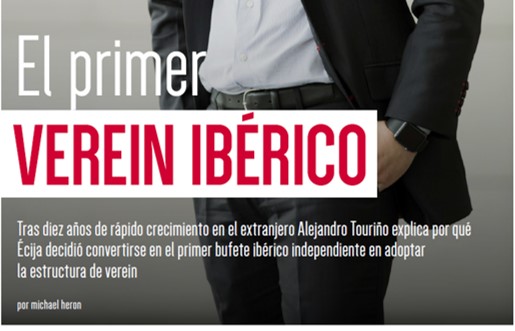Ecija, the first Iberian verein
Three out of the top five global law firms by revenue from 2021, all have one thing in common. They are all vereins. The verein structure allows global firms to ‘merge’ together, under a single unified brand, and maintain financial independence and legal liability. DLA Piper, Dentons and Baker McKenzie are the most famous and successful examples. It was therefore a big story in the Spanish market, when Ecija announced they were becoming a verein. Some of the disadvantages of using this model include partners allocating work to overseas offices and not sharing profit, stronger firms putting strategic pressure on less powerful firms within the group and the challenge of achieving consistency in relation to client service, standards and profits. During this interview, Alejandro Touriño (pictured), managing partner at Ecija, does not shy away from addressing these challenges. In fact, he admits that it is not for everyone, but shares with us why it works for Ecija, as they continue on their journey of international expansion.
How would you summarise the first six months of 2022?
We are in a very positive economic situation, which is the same for the entire market. It’s going well for us, but I have the feeling that it’s going well for all law firms. I think there is a very positive economic dynamic in the sector. Obviously we don’t know what we will be facing during the months ahead, but the mood in general is one of optimism. Speaking about clients, we are seeing many projects with growth. During the two years of the pandemic we saw more restructurings, ERTEs, etc., but now the focus of large clients is on growth, digitization and entering other markets. I think there is a very positive atmosphere globally, and when we talk to most of our partners in Latin America, the feeling is shared. In Portugal we are also seeing a favourable situation with a lot of foreign investment. We are happy and working hard.
You are the first verein structure implemented by a Spanish law firm, why?
From my perspective, it is not about reinventing the wheel, but rather consolidating a model that was necessary for us. Our current size covering 16 countries and 32 offices, taking into account that ten years ago we only had one office in Madrid, has forced us to study examples of other firms in the international market that had grown so quickly, and we arrived at the conclusion that the Verein model was the most suitable for us. Each country and territory has absolute economic authority, however, there is a unique brand, a unique governing structure, unique information systems, etc. It is a model that moves away from the partnership and that is better suited to our current needs.
Using the example that one of the partners assigns work to another foreign law firm within Ecija, they lose income since this profit fund is not distributed. How do you see that working?
It is true that, for example, when there is a matter that Spain captures, and sends it to another country where the job is 100% executed, the one that receives the direct benefit is the country that carries out and executes the work. However, there are many cross-border projects where different jurisdictions share work and benefits. We work with many IBEX35 companies that hire us for our presence in Latin America, with which the income is distributed among our different offices within the Ecija structure.





